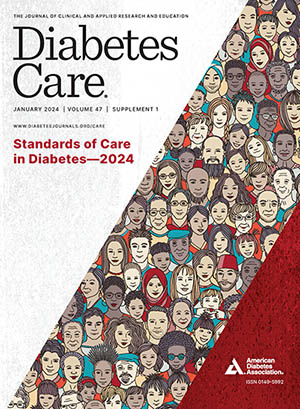
The American Diabetes Association (ADA) recently released new guidelines that include updates to recommendations around new class of obesity drugs, diabetes technology, the use of teplizumab, and new screening practices in their 2024 Standards of Care in Diabetes manual. The manual is a set of comprehensive and evidence-based guidelines for managing Diabetes including Diabetes Type 1 and 2, gestational diabetes, and prediabetes based on the latest scientific research and clinical trials. It also includes strategies for diagnosing and treating diabetes in both youth and adults, methods to prevent or delay type 2 diabetes and its associated comorbidities such as cardiovascular disease and obesity, and therapeutic approaches focused at minimizing complications and enhancing health outcomes.
Robert Gabbay, MD, PhD, the ADA's chief scientific and medical officer, stated that "the latest ADA guidelines present pivotal updates for health care professionals, ensuring comprehensive, evidence-based care for diabetes management." It reflects their "ongoing commitment to optimizing patient outcomes through informed, adaptable, and patient-centered health care practices." He added that the ADA's Standards of Care ensures health care professionals, especially the primary care workforce, provide the best possible care to those living with diabetes.
Key highlights in Standards of Care in Diabetes—2024 include:
- Addressing Obesity: New updates in managing obesity in people with diabetes, including approaches to reduce therapeutic inertia, support more personalization, and incorporate additional obesity measurements beyond body mass index (BMI). For example, waist circumference, waist-to-hip ratio, and/or waist-to-height ratio.
- Heart Health Screening: New screening recommendations for heart failure in individuals with diabetes.
- Peripheral Arterial Disease (PAD) Screening: Updated guidelines for PAD screening in diabetes patients.
- Teplizumab Use: Guidance on screening and the use of teplizumab, approved to delay type 1 diabetes onset.
- Advanced Medications: Guidance on the use of new obesity medications such as glucagon-like peptide 1 (GLP-1) agonists or dual glucose-dependent insulinotropic polypeptide (GIP) receptor agonists for sustained weight management.
- Refined Diagnosis and Classification: Improved guidance for diabetes diagnosis and classification.
- Hypoglycemia Management: Heightened focus on preventing and managing hypoglycemia.
- Expanded Screenings: Emphasis on screening individuals with diabetes for nonalcoholic fatty liver disease (NAFLD) and nonalcoholic steatohepatitis at primary care and diabetes clinics, and on the evaluation and treatment of bone health as well as added attention to diabetes-specific risk factors for fracture. It includes guidelines focusing on screening and management of people with diabetes and disability.
- Technology Integration: Encouraging healthcare providers to adeptly utilize AI for retinal screenings, telehealth, and digital tools in diabetes self-management education.
- COVID-19 Link: New information on the possible association between COVID-19 infections and new onset of type 1 diabetes.
Additional updates encompass immunization guidance for newly approved RSV vaccines in diabetic adults over 60 years of age, cultural sensitivity in self-management education with considerations for changing reimbursement policies, psychosocial screening protocols, emphasis on diabetes technology like continuous glucose monitors (CGMs) and automated insulin deliver (AID) systems, and inclusion and person-centered care.
Chuck Henderson, the ADA's CEO, stressed the significance of these standards in elevating diabetes care. He believes that the Standards of Care is critical to ensuring the improved treatment of diabetes, which requires continuous care through a well-informed and coordinated health care team.
Each year, the ADA updates its Standards of Care through the concerted efforts of its Professional Practice Committee (PPC). This team comprises 21 global experts from diverse professional backgrounds, which includes physicians, nurse practitioners, certified diabetes care and education specialists, registered dietitians, pharmacists, and methodologists. Their collective expertise spans numerous fields, including adult and pediatric endocrinology, epidemiology, public health, cardiovascular risk management, kidney disease, microvascular complications, preconception and pregnancy care, weight management, diabetes prevention, behavioral and mental health, inpatient care, and technology in diabetes management. Additionally, the committee collaborates with 19 specialized content experts.
Notably, the 2024 Standards of Care have received endorsements from esteemed bodies such as the American College of Cardiology, the American Society of Bone and Mineral Research, and the Obesity Society. Their collective support underscores the credibility and relevance of these updated standards in the realm of diabetes care.
The 2024 Standards of Care is accessible online and is published as a supplement to the January 2024 issue of Diabetes Care. An abridged version will be available in Clinical Diabetes, alongside a Standards of Care app and pocket chart for primary care providers. The online version will remain dynamic, updated in real-time to reflect new evidence or regulatory changes. Accessible resources including webcasts with CE credits and slide decks are available on DiabetesPro.
